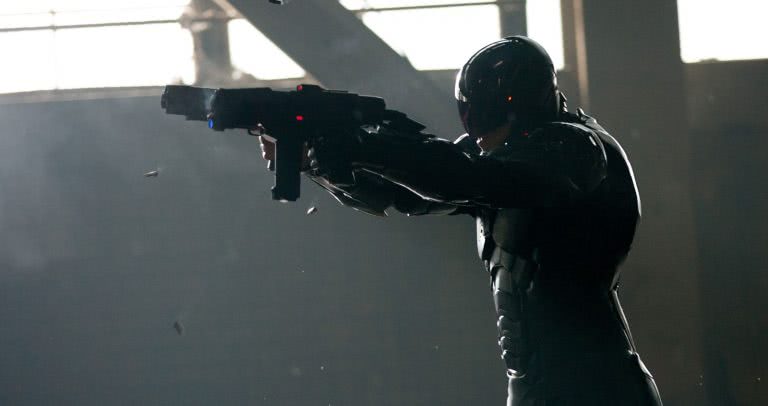Paul Verhoeven’s RoboCop remains arguably the Dutch-born director’s most universally beloved film from his period as a Hollywood gun-for-hire, as well as his most baldly subversive; delivering the requisite shoot-em-up goods alongside a comically dystopian vision of a future America as a technocratic, corporatised police state.
The inevitable remake thus has large shoes to fill, and with another foreigner at the helm making his US debut – Brazilian directorJosО Padilha(Elite Squad) – you could be forgiven for thinking the choice was an attempt at recapturing the original film’s sense of an outsider’s bemusement.
Alas, the revampedRoboCopis dull enough to make one wish for a patriotic, Michael Bay-style salute.Joshua Zetumer’s screenplay dutifully connects the dots between the original film’s basic ingredients and contemporary America, keeping the action in Detroit, and alluding to the hot topic of drone attacks – the opening scene shows the RoboCop prototypes malfunctioning while being tested by US military in the streets of Tehran, killing nearby innocents. This prelude is supposed to constitute a ‘critique’, but the film plays it safe enough throughout that similar events never occur on US soil, and all bloodletting has been kept to a minimum to ensure a US PG-13 rating (contra the OTT splatter of Verhoeven’s original) for maximum box office returns. It doesn’t help thatJoel Kinnamenplays the iconic title role as little more than a sentient jawline, even in his totally-corporeal stage as local cop Alex Murphy, whileAbbie Cornishis wasted in a thankless suffering-wife role.
The film flirts with interestingness when depicting the porous line between artificial intelligence and the real thing, as Murphy undergoes his transformation, but even then it’s all secondhand depth. Meanwhile, the 1987 film’s much-loved interstitial fake advertisements are substituted for Samuel L. Jackson periodically appearing as a Rush Limbaugh-esque right-wing TV commentator, giving a Greek chorus-like commentary on the alleged advances represented by RoboCop’s implementation. That leaves the film’s signature line to bedelivered in bastardised form by a military tactician played by Jackie Earle Haley: “I wouldn’t buy that for a dollar”. At least it saved me the effort.
In cinemas now.

































